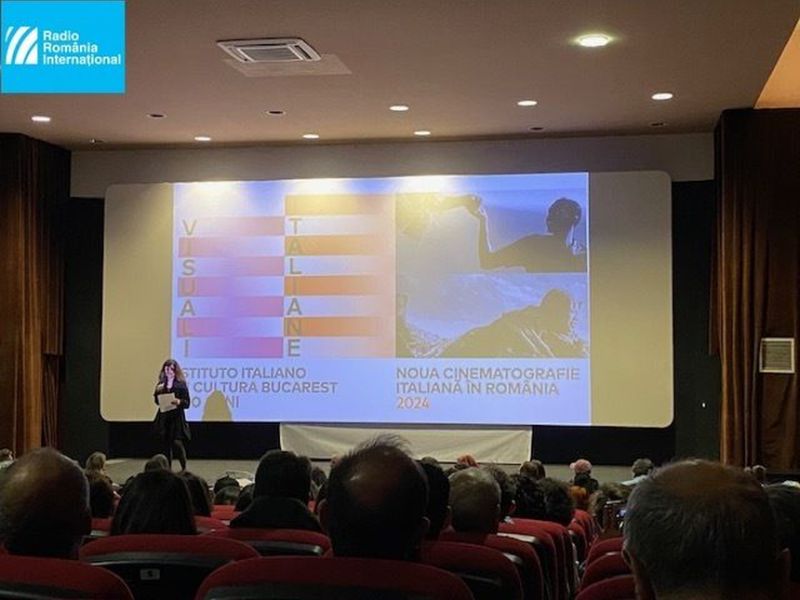The Poetry Can be Found in Bistritsa International Poetry and Chamber Music
An overview of a festival that has become a tradition in Romania.

Corina Sabău, 18.06.2016, 14:00
Poetry can be found in Bistrita for seven years now, in July. And it’s not only poetry, but also public readings, book launches, live concerts, theatre shows, debates, all part of the Poetry can be Found in Bistrita International Poetry and Chamber Music Festival, aimed at giving a fresh impetus to Bistrita’s cultural life. All that stands proof of the fact that the need for literature, the need to meet the writers in person, is very valid today, the more so as unlike other cultural spaces, Romania does not have a tradition of its own as regards public readings.
Acclaimed writer Mircea Cartarescu used to say, sometime after one of the early editions of the festival, “I did not have very high expectations, yet my expectations, had they been high, were exceeded by the festival. I overcame my hesitations and, to my surprise, I managed to communicate with the people just fine and I gained a lot from that. As I was saying on stage: now I have a much better image of what is going on in Romanian poetry”. With more details, here is Marin Malaicu-Hondrari the selector of the Poetry can be Found in Bistrita International Poetry and Chamber Music Festival.
“I truly believe Mircea Cartarescu’s statement, since I can still remember the edition he was invited to, quite unlike other poets he attended all reading sessions and listened to all poets, be they very young or poets of his generation. What we basically had in mind, writer Dan Coman, Gavril Tarmure, the director of the festival and myself, was to bring over poets of all generations, and from one year to the next we tried to provide an overview of Romanian poetry of today, also seeking to include mainly those who already had already at least one volume published. For instance, this year invited to take part in the festival were poets who came up with new poetry volumes, in 2015, or even this year, 2016.”
With each edition, the Poetry can be Found in Bistrita International Poetry and Chamber Music Festival has grown in significance. It boasts a greater number of stage performances, reading sessions in a penitentiary, discussions on literature, specifically the debate hosted by the Plan B Café, which has already become a tradition, events staged by the Blecher Institute, the reading club run and chaired by Claudiu Komartin, a club that roughly hosted one hundred and fifty living Romanian writers, of all literary generations, ranging from writers of the 60s to those of the post-2000 generation, who haven’t published their debut volumes yet.
For several editions now, a prose writer has been the poets’ guest, and in 2013, the event had its inaugural international edition, where quite a few poets offered reading sessions. Among them, Constantin Acosmei, Daniel Bănulescu, Andrei Bodiu, Marius Chivu, Vladimir Đurišić of Montenegro, Gabi Eftimie, Jan Mysjkin of Belgium, Mihail Gălăţanu, Adela Greceanu, István Kemény of Hungary Vlad Moldovan, Ion Mureşan, Ştefan Manasia, Henrik Nilsson of Sweden, Enrique Nogueras of Spain, Florin Partene, Ioan Es. Pop and Oana Văsieş.
The festival has acquired an international scope. This wasn’t something organizers had included on their agenda from the very beginning. With details on that, here is one of the selectors in the Poetry Can be Found in Bistrita International Poetry and Chamber Music Festival, Marin Malaicu-Hondrari.
“When we started off, the only thing we knew was we would have liked a lot to be able to offer poetry to audiences in Bistrita and beyond, as coming to the festival are people from other parts of the country as well. It never occurred to us someday we would be able to invite foreign poets and it never occurred to us professionals would also give us a hand. They helped translate works for the festival, just like Florin Bican did. He helped us a lot in the past and will do the same this year as well. Something like that gives me a lot of confidence, it appears that if you do things properly and do not do your job hastily, and if you do not make any compromises, things are highly likely to work out fine. It is true that the festival has grown and has been very well received in the cultural press and the European cultural space. For instance, we have managed to create a strong bond with the Flemish Literary Fund, which supports the participation of a Dutch poet in the Bistrita festival each year. And as of this year, we hope we can continue our collaboration with the US Embassy, which this year helped us bring over two poets from the United States.”
Here is writer and selector Marin Malaicu-Hondrari, this time speaking about how the Romanian poetry of today is viewed from the perspective of the Poetry Can be Found in Bistritsa International Poetry and Chamber Music Festival.
“Today’s Romanian poetry looks very, very good, and I’m saying this comparing it to the Spanish-language poetry. We really stand at the highest level at the moment. We also have a promising young generation, and I would like to mention the name of Alex Vasies, who this year is invited to the festival, and who has recently got his debut volume, The Installation, brought out by the Cartea Romaneasca Publishers, then there’s also Alina Purcaru who made her debut in poetry and who got her debut book brought out by the Cartea Romaneasca Publishers. If we take the names of Ioan Es.Pop and Angela Marinescu into account, we fare excellent, as regards poetry. Of course, I mean that in comparison to the literature of other countries. If we think of market sales percentage alone in the case of poetry books, we fare less satisfactory, but that only happens because the Romanian book market is a market that doesn’t work quite well. The same goes for prose books. On the bright side however, poetry books continue to be published, there are publishers who have the courage to bring out poetry books, even translations. As for us, with the Charmides Publishers, we brought out Romanian versions of Hungarian poets, Polish poets, and right now we’re trying to publish an anthology of poems by a Spanish author.”
(Translated by E. Nasta)





























